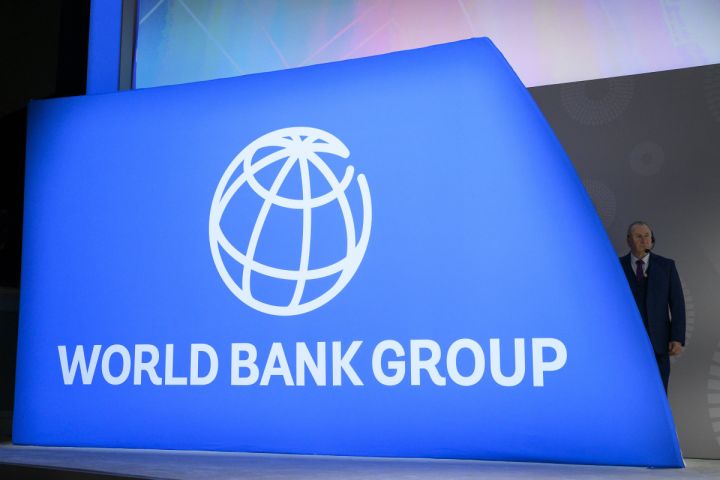"Azərbaycan iqtisadiyyatı neft qiymətlərindən asılılığını qoruyur"

"Azərbaycanın kredit reytinqinin "B2" səviyyəsində, reytinq üzrə proqnozun isə stabil olması ölkə iqtisadiyyatının, maliyyə və bank sisteminin neft qiymətlərindən asılılığını əks etdirir".
Bu barədə "Moody's" beynəlxalq reytinq agentliyinin yaydığı məlumatda qeyd olunub.
Agentliyin baş vitse-prezidenti və məqalənin müəlliflərindən biri Kristin Lindoun (Kristin Lindow) sözlərinə görə, neftin ucuzlaşması Azərbaycan iqtisadiyyatına təsirsiz ötüşməyib.
"Hökumətin Dövlət Neft Fondundan (ARDNF) böyük maliyyə dəstəyi almasına baxmayaraq, dövlət neftin aşağı qiymətlərinin təsirini yumşaldacaq fiskal siyasət üçün Fondun ehtiyatlarından məhdud dərəcədə istifadə edir. Düşünürük ki, 2017-ci ildə Azərbaycanda ümumdaxili məhsul istehsalı azalacaq. Ötən illə müqayisədə bu ilin birinci yarısında ÜDM 1,4% azalıb. İnanırıq ki, il üzrə ümumi azalma elə eyni səviyyədə olacaq", - deyə məlumatda bildirilir.
"Moody`s" yaxın iki ildə Azərbaycan büdcəsinin defisitlə icra olunacağını proqnozlaşdırır
Qeyd olunur ki, Azərbaycanın dövlət borcunun ÜDM-ə nisbəti 2014-cü ildəki 14,4%-dən 2016-cı ildə 50,7%-dək artıb.
Məlumatda vurğulanıb ki, bunun əsas səbəbləri manatın amortizasiyası və dövlət zəmanətli borcların artmasıdır.
Agentliyin proqnozuna əsasən, neftin qiyməti 45-55 dollar diapazonunda ticarət olunmağa davam edərsə, 2017-ci il dövlət büdcəsi 2,9% defisitlə icra olunduğu halda, 2018-ci ildə defisit 1,8% təşkil edə bilər.
ABB-nin bərpası vaxt aparacaq
Azərbaycan hökuməti və Mərkəzi Bank (AMB) bank sektoruna dəstək verməkdə davam edir. Bu barədə də "Moody`s" beynəlxalq reytinq agentliyinin yaydığı məlumatda bildirilir.
Agentliyin hesablamalarına əsasən, ötən il bank sektoruna verilən dəstəyin həcmi ÜDM-in təxminən 30%-nə bərabər olub. Bura əsasən "Azərbaycan Beynəlxalq Bankı" ASC-nin (ABB) xarici öhdəliklərinin restrukturizasiyası daxildir.
"Moody`s" hesab edir ki, restrukturizasiya prosesinə baxmayaraq, ABB-nin aktivlərinin keyfiyyətinin və gəlirliliyinin bərpası kifayət qədər vaxt alacaq.
"Ümumilikdə, yaxın perspektivdə bank sektorunun vəziyyəti zəif olaraq qalacaq", - deyə məlumatda vurğulanıb.
Bundan öncə ABB bəyan edib ki, xarici öhdəliklərinin könüllü restrukturizasiyası planına uyğun olaraq 1 sentyabr 2017-ci il tarixində bankın kreditorlarına yeni maliyyə alətləri təqdim edilib və bununla da müəyyən öhdəliklərin dövlətə ötürülməsi uğurla başa çatıb.
Moody's: Azerbaijan's credit profile reflects country's vulnerability to
volatile oil prices
Azerbaijan's Ba2 rating and stable outlook
reflect the vulnerability of the economy, government finances and banking
system to oil price volatility, Moody's Investors Service said in an
annual report today.
The report, "Government of Azerbaijan -- Ba2 stable, Annual Credit
Analysis", is now available on www.moodys.com. Moody's subscribers can
access this report via the link at the end of this press release. The
research is an update to the markets and does not constitute a rating
action.
"The drop in oil prices resulted in a prolonged recession in Azerbaijan
and has put pressure on the government and external finances," said
Kristin Lindow, a Moody's Senior Vice President and co-author of the
report. "Although the government's finances are supported by a large
sovereign wealth fund with a value equivalent to nearly 90% of GDP, the
outlook for oil and gas revenue is sufficiently constrained that the
government has limited flexibility to use the fund's resources for
counter-cyclical fiscal policy that would soften the impact of lower oil
prices."
Moody's expects that Azerbaijan's economy will contract for the second
consecutive year in 2017. In the first half of the year, the economy
shrank by 1.4% compared to a year earlier, and Moody's believes that the
contraction for the whole year will be at a similar rate.
Oil prices remain relatively low and credit is continuing to shrink
rapidly amid ongoing banking sector distress. It is unclear whether the
economy will hit bottom this year in light of the government's
pro-cyclical fiscal consolidation, tight monetary policy and a managed
float of the exchange rate that is not allowing the manat currency to
find its market-determined level.
The government and central bank have tried to shore up the country's
banking sector over the past year, a process that has cost roughly 30%
of GDP, in particular through the cost of restructuring the country's
largest bank, the International Bank of Azerbaijan (IBA), which is
nearly 100% state-owned.
Despite the restructuring, Moody's believes that the bank will still face
challenges in restoring asset quality and profitability amidst managing
its remaining open foreign-currency position. The wider banking system
will also remain weak for some time.
The country's gross debt-to-GDP ratio, including explicit government
guarantees, increased steeply to 50.7% in 2016 from 14.4% in 2014 due
mainly to the large depreciation of the manat and an increase in
government guaranteed debt.
Given still weak economic dynamics, Moody's anticipates fiscal deficits
of 2.9% and 1.8% of GDP in 2017 and 2018, respectively, assuming oil
prices stay in the range of $45-$55 per barrel over the period.
Decisive action to address the key challenges in the country's credit
profile, namely the erosion in fiscal strength, the lack of economic and
export diversity and the weak banking sector, would generate upward
pressure on the rating.
However, any improvement would be unreliable if founded solely on rising
oil prices, as distinct from a gradual diversification of the economy to
address the high dependence on oil, and a more strongly capitalized,
liquid banking system.
The ratings would come under negative pressure if the government's
balance sheet deterioration were to continue beyond 2018, particularly
if that was associated with further banking sector shocks and increased
budgetary reliance on the sovereign wealth fund's assets that further
eroded the country's net creditor position.
© APA
Müştərilərin xəbərləri
SON XƏBƏRLƏR
-
16 saat əvvəl
Mərkəzi Bank 2026-cı ilin ilk iş gününün rəsmi məzənnəsini açıqladı
- 17 saat əvvəl
- 17 saat əvvəl
-

- 17 saat əvvəl
-
17 saat əvvəl
Dövlət şirkətlərini və publik hüquqi şəxsləri monitorinq edəcək agentlik yaradıldı - FƏRMAN
-
17 saat əvvəl
"Qızıl Fond üçün 11 milyard dollar gəlir formalaşdırıb" - AZƏRBAYCAN FONDUNUN DİREKTORU
- 17 saat əvvəl
-
17 saat əvvəl
Azad edilmiş ərazilərdə bir sıra obyektlər üçün elektrikə qoşulma xidməti pulsuz oldu
-
17 saat əvvəl
Dünya Bankı qiymətləndirməsində Azərbaycanın maliyyə xidmətləri üzrə 101 ölkə arasında zirvədə
- 17 saat əvvəl
-
17 saat əvvəl
Ölkədə ilk dəfə - “PAŞA Bank” yeni POS nağdlaşdırma funksiyasını istifadəyə verdi
-
18 saat əvvəl
Hər 20 litr Aİ-92 benzin və ya 10 litr dizel 1 manat baha başa gələcək
Son Xəbərlər

Mərkəzi Bank 2026-cı ilin ilk iş gününün rəsmi məzənnəsini açıqladı

6,3 milyard manatlıq defisiti olan "Azərbaycan Dəmir Yolları" 331 investordan 30 milyon dollar borc aldı

"Hazırda yumurta Gürcüstanda 43 qəpiyə, Türkiyədə 33 qəpiyə, Azərbaycanda isə 16-19 qəpiyə satılır. Nəticələr, çox əladır"

“Azercell Könüllüləri” uşaqlara bayram sevinci yaşadıb

"Qızıl Fond üçün 11 milyard dollar gəlir formalaşdırıb" - AZƏRBAYCAN FONDUNUN DİREKTORU

Dünya Bankı qiymətləndirməsində Azərbaycanın maliyyə xidmətləri üzrə 101 ölkə arasında zirvədə

Birbank-da əlavə 3 ay taksitlə bayramı dolu-dolu yaşayın
Ən çox oxunanlar

Dövlət bir sıra məhsul və xidmətlər üzrə qiymətlərə dəyişiklik etdi

“SİMA İmza”nın tərəfdaş sayı 100-ə çatdı

ABB-dən daha 3 hesabat!

Azərbaycanda Aİ-92 markalı benzin və dizel bahalaşdı


























